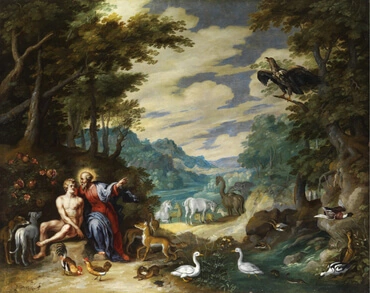1
And these are the births of Esau; he◦ is Edom.
2
Esau took his women from the daughters of Canaan; Adah the daughter of Elon the Hittite, and Oholibamah the daughter of Anah and the daughter of Zibeon the Hivite*;
3
and Basemath the daughter of Ishmael, the sister of Nebaioth.
4
And Adah gave··birth to Eliphaz for Esau; and Basemath gave··birth to Reuel;
5
and Oholibamah gave··birth··to Jeush, and Jaalam, and Korah; these are the sons of Esau that were··born to him in the land of Canaan.
6
And Esau took his women, and his sons, and his daughters, and all the souls of his house, and his livestock, and every beast of his, and all that he bought, which he had acquired in the land of Canaan, and went unto▵ a land from the face of Jacob his brother.
7
For their acquisition was too· much ·for dwelling together; and the land of their sojournings was· not ·able to bear them on··account··of◦ their livestock.
8
And Esau dwelt in Mount Seir; Esau, he◦ is Edom.
9
And these are the births of Esau the father of Edom* in Mount Seir.
10
These are the names of the sons of Esau; Eliphaz the son of Adah Esau’s wife, Reuel the son of Basemath Esau’s wife.
11
And the sons of Eliphaz were Teman, Omar, Zepho, and Gatam, and Kenaz.
12
And Timna was concubine to Eliphaz the son of Esau; and she gave··birth to Amalek for Eliphaz; these are the sons of Adah Esau’s wife.
13
And these are the sons of Reuel; Nahath and Zeraḥ, Shammah and Mizzah; these were the sons of Basemath Esau’s wife.
14
And these were the sons of Oholibamah—the daughter of Anah, and the grand- daughter of Zibeon—Esau’s wife; and for Esau she gave··birth to Jeush, and Jaalam, and Korah.
15
These are the leaders of the sons of Esau; the sons of Eliphaz the firstborn of Esau; leader Teman, leader Omar, leader Zepho, leader Kenaz,
16
leader Korah, leader Gatam, leader Amalek. These are the leaders of Eliphaz in the land of Edom; these are the sons of Adah.
17
And these are the sons of Reuel the son of Esau; leader Nahath, leader Zeraḥ, leader Shammah, leader Mizzah; these are the leaders of Reuel in the land of Edom; these are the sons of Basemath Esau’s wife.
18
And these are the sons of Oholibamah Esau’s wife; leader Jeush, leader Jaalam, leader Korah; these are the leaders of Oholibamah the daughter of Anah, Esau’s wife.
19
These are the sons of Esau, and these are their leaders; he◦ is Edom.
20
These are the sons of Seir the Horite, dwelling··in the land; Lotan and Shobal and Zibeon and Anah,
21
and Dishon and Ezer and Dishan; these are the leaders of the Horite, the sons of Seir in the land of Edom.
22
And the sons of Lotan were Hori and Hemam; and the sister of Lotan was Timna.
23
And these are the sons of Shobal; Alvan and Manahath and Ebal, Shepho and Onam.
24
And these are the sons of Zibeon, both Ajah and Anah; he◦ is the Anah who found the mules◦ in the wilderness, when he pastured the donkeys for Zibeon his father.
25
And these are the sons* of Anah: Dishon, and Oholibamah the daughter of Anah.
26
And these are the sons of Dishon: Hemdan and Eshban and Ithran and Caran.
27
These are the sons of Ezer; Bilhan and Zaavan Akan.
28
These are the sons of Dishan: Uz and Aran.
29
These are the leaders of the Horite: leader Lotan, leader Shobal, leader Zibeon, leader Anah,
30
leader Dishon, leader Ezer, leader Dishan. These are the leaders of the Horites, according··to▵ their leaders in the land of Seir.
31
And these are the kings that reigned in the land of Edom, before there reigned a king over the sons of Israel.
32
And Bela the son of Beor reigned in Edom; and the name of his city was Dinhabah.
33
And Bela died, and Jobab the son of Zeraḥ of Bozrah reigned in· his ·stead.
34
And Jobab died, and Husham of the land of the Temanites reigned in· his ·stead.
35
And Husham died, and Hadad the son of Bedad, who smote Midian in the field of Moab, reigned in· his ·stead; and the name of his city was Avith.
36
And Hadad died, and Samlah of Masrekah reigned in· his ·stead.
37
And Samlah died, and Shaul of Rehoboth of the river reigned in· his ·stead.
38
And Shaul died, and Baal-hanan the son of Achbor reigned in· his ·stead.
39
And Baal-hanan the son of Achbor died, and Hadar reigned in· his ·stead; and the name of his city was Pau; and his wife’s name was Mehetabel, the daughter of Matred, the daughter of Me-zahab.
40
And these are the names of the leaders of Esau, according··to▵ their families, according··to▵ their places, in their names; leader Timna, leader Alwah, leader Jetheth;
41
leader Oholibamah, leader Elah, leader Pinon;
42
leader Kenaz, leader Teman, leader Mibzar;
43
leader Magdiel, leader Iram. These are the leaders of Edom, for their dwellings in the land of their possession◦. Esau, he◦ is the father of Edom.







